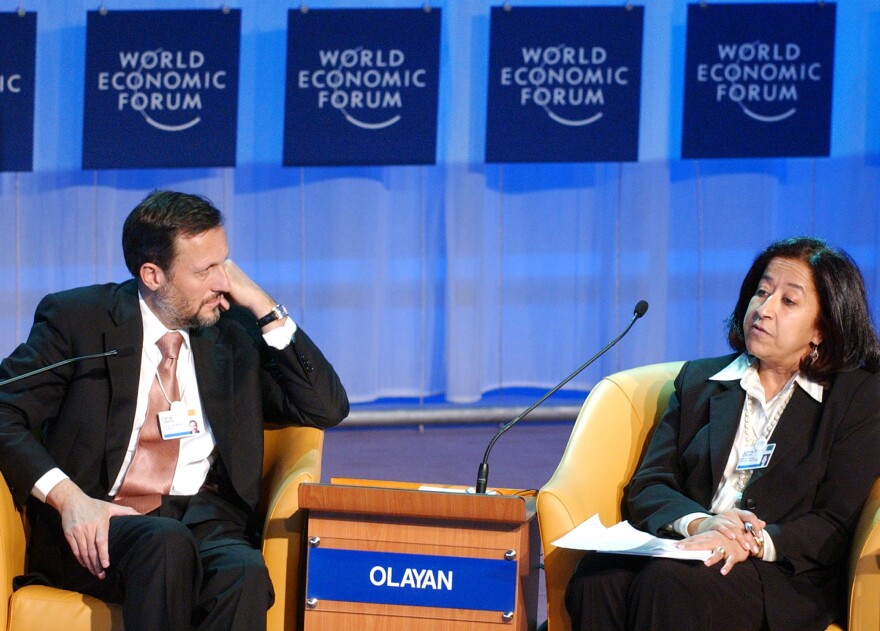Lubna Olayan remembers the date. It was April 15, 1983, when she and her father sat down to dinner in Riyadh. Olayan and her American husband, John Xefos, had just returned to her native Saudi Arabia after nine years in the United States.
"Over dinner he says 'Lubna, what are you going to be doing here?' " Olayan recalls her father saying. Olayan had worked as a J.P. Morgan analyst in New York, and half-heartedly thought she'd see if there was work at a bank in Saudi Arabia. But her father had something in mind.
"He just looked at me and said, 'You don't have to do that. My executive assistant just submitted his resignation. Why don't you start tomorrow morning?' "
Thirty-five years later, Olayan is the powerful CEO of Olayan Financing Company, the Middle East arm of the global private investment company The Olayan Group. Olayan Financing works on everything from medical supplies to office equipment to fast food.
The 62-year-old Olayan rarely gives interviews. The day in April she met NPR in her bright, cluttered office in Riyadh, she was wearing a cream-colored sweater and a stylish necklace. Her hair fell to her shoulders. It would be hard to tell you were in Saudi Arabia, where women routinely wear an abaya, the floor-length covering, and head scarf.
Olayan is a regular speaker at the World Economic Forum in Davos, Switzerland, and has been considered one of the most influential people in business by Forbes, Fortune and Time magazine. She has shattered stereotypes of Saudi women who are widely viewed by the outside world as cloistered and subjugated. She's seen as a pioneer in a country where women have had few liberties and there's segregation between the sexes.
"Even my most chauvinist of Saudi friends and clients have great admiration for the way that she manages her companies," executive Bernd van Linder told Fortune in 2015, when he was CEO of the then-named Saudi Hollandi Bank. "She is respected as a person rather than as the first Saudi woman to do this or that."

Olayan says for her first 18 years at Olayan Financing Company she was the only woman who worked there.
One of the hardest things about it? "There was no ladies' room," she says. "I would travel to go visit many of our factories ... I mean absolutely no woman in any of the factories, no women in the boardroom, so there is no need for the facilities," she says.
Olayan says she felt pressure to prove she wasn't given the job just because she was the boss' daughter.
Her father, Suliman Olayan, started the company as a trucking business back in 1947. During a visit to the U.S. in the 1960s, Lubna Olayan says, her father "fell in love" with New York and its stock exchange.
He instilled hard work in his four children, teaching them you have to earn your money, as well as people's respect, she says. Above all else, he wanted Olayan, her two sisters and one brother to get a university education. (Lubna Olayan went to Cornell and got her MBA at Indiana University's Kelley School of Business.)
Olayan spent years working with her father. And as she rose to the top, she says, she urged him to hire more women in the company.
How is our society going to progress if 50 percent of the population is not allowed to contribute?
There were a few other women in business at the time, usually working in small operations run out of their homes. She couldn't understand why men and women were able to work together in Saudi hospitals, but not in offices, factories or elsewhere.
"How is our society going to progress if 50 percent of the population is not allowed to contribute?" she says.
Olayan wanted to change that. She slowly started reaching out to male colleagues and senior members of government for support. She says they encouraged her because they had wives and daughters who wanted to work. But they also warned her to respect the kingdom's rigid customs, and avoid confrontation.
"So, you negotiate, you deal, you do this, you take and give," she says. For her, the ultimate goal was to have women in the workplace.
Finally in 2001, Olayan took a stand and hired her first female colleague, Hana alSyead, whose mission was to increase the number of women employees at the Olayan Financing Company. Soon 40 females were hired to work in one of the factories making disposable medical gowns.
From there, they started building the ranks of women in the offices — some segregated, some mixed. It was all kept under the radar to avoid attracting attention and creating problems. "It was key not to speak about it," she says.
Now things are slowly changing.
"It's completely different now," she says. "The change from when we started to where we are now is tremendous."
"When we started hiring women ... you needed the male guardian's approval for the woman to work," she says. Now, she says, it's easier for women to get jobs in Saudi Arabia.
Still, there are only about 500 women at Olayan Financial Company, a small fraction of its 16,000 employees across Saudi Arabia and the Middle East. Olayan acknowledges she has a lot to do to include more women, especially in senior positions. She'd like to see women grow to 30 percent of the company's Saudi personnel.
Lately, Olayan has gotten a boost in her efforts: The government is also encouraging women to enter the workforce, as part of a reform plan to diversify the economy and create jobs. That even includes allowing women to drive, starting in June, to make it easier to get to work.
Driving a car is something even Olayan has not been allowed to do in Saudi Arabia, despite her power and prestige.
Copyright 2021 NPR. To see more, visit https://www.npr.org.




